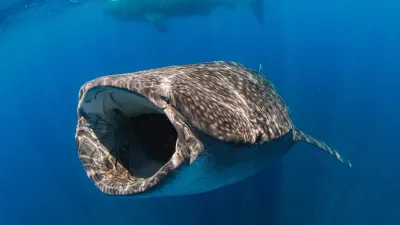A recent study reported in The Guardian suggests there may be more sustaining the ocean’s biggest fish than previously believed.
While studying whale sharks around Australia’s Ningaloo Reef, scientists made a surprising discovery, leading Dr Mark Meekan, biologist from the Australian Institute of Marine Science, to suggest that “everything we thought we knew may not actually be true”.
It appears that these giants of the ocean regularly enjoy a sizable serving of seaweed alongside large helpings of krill. This revelation means that whale sharks have officially replaced the Kodiak bear as the world’s largest omnivore and casts questions over what is truly sustaining the biggest fish in the sea.
Dr Meekan explained, “we’ve seen them coming to Ningaloo and we’ve seen them feeding on krill and we’ve thought, ‘Boom there’s the answer’. But with sophisticated methods that look at the microchemistry of these animals, this story becomes much, much more complex.”
During the study, scientists collected and analysed amino and fatty acids from a range of possible food sources, including both plankton and seaweed. This was then compared to products present in skin samples collected from the local population of whale sharks.
Dr Meekan believes the whale sharks’ immense size may have initiated an evolutionary response that has effectively turned useless bycatch into valuable sustenance.
“These are very big animals and when you’re a huge animal you need lots of food,” he said. “But it costs lots of energy to push their mouths - open like a huge net - through the water. When you get a gut full of food but there’s also a lot of algae, what do you do? Do you throw it up? Energetically that’s a very costly thing to do because you’ve just spent all this energy collecting it. Whale sharks have simply got round this in an evolutionary sense by being able to digest the seaweed. They are turning by-catch into a part of their diet.”
Another aspect of the study produced yet more remarkable results. Tests on whale shark poo confirmed that while the sharks were certainly eating a lot of krill, they weren’t metabolising very much of it - suggesting it wasn’t necessarily their primary food source.
The study and its results have been published in the journal Ecology.
Dreaming of swimming alongside these ocean giants?
Contact one of our sustainable dive travel experts today

ZuBlu is the leading dive travel agency to search, compare and book scuba diving travel worldwide.






